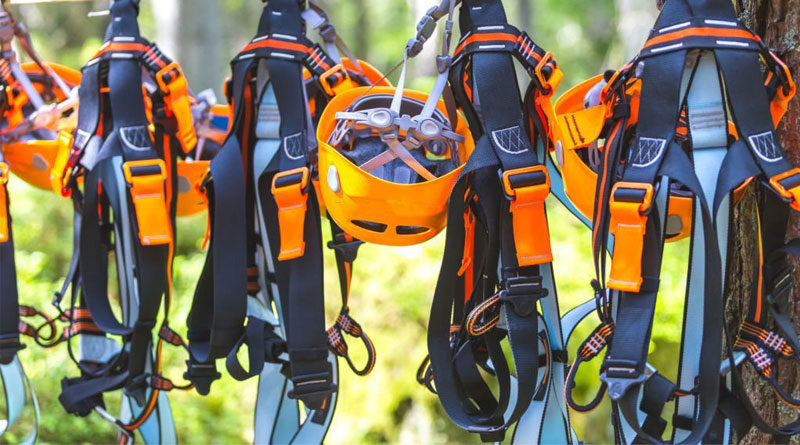How Much Does A Climbing Harness Weigh?
The weight of a climbing harness can vary depending on the specific model and size. However, most standard climbing harnesses weigh between 250 to 500 grams (8.8 to 17.6 ounces). Ultra-lightweight harnesses designed for alpine or mountaineering use can weigh as little as 100 grams (3.5 ounces), while more robust harnesses with extra padding and gear loops can weigh upwards of 600 grams (21 ounces). It’s important to choose a harness that fits well and is appropriate for your intended use, rather than solely focusing on weight.
Factors Affecting the Weight of a Climbing Harness
The weight of a climbing harness is influenced by several factors. These include the material used in making the harness, the design and construction of the harness, the size of the harness, and any extra features added to the harness.
Materials
The material used to make a harness has a large impact on its weight. Nylon, polyester, and Dyneema are the most common materials used to make harnesses. Nylon and polyester are heavier than Dyneema, a lightweight high-strength synthetic fiber. As a result, harnesses made of Dyneema are typically lighter than those made of nylon or polyester.
Design and Construction
The weight of a harness is also affected by its design and construction. A harness with fewer features and less padding will typically be lighter than one with a more complicated design. A sport climbing harness, for example, will be lighter than a big wall harness, which will have more padding and gear loops to accommodate heavier loads.
Size
The weight of a harness is also determined by its size. Larger harnesses necessitate more material and padding and thus weigh more than smaller harnesses. A size medium harness, for example, will be lighter than a size large harness made of the same materials and construction.
Extra Features
Finally, adding extra features to a harness can increase its weight. Gear loops, adjustable leg loops, and extra padding are examples of such features. While these features can improve the comfort and versatility of a harness, they also add weight to the harness.
Average Weight of a Climbing Harness
The average weight of a climbing harness can vary depending on the specific model and size. However, most standard climbing harnesses weigh between 250 to 500 grams (8.8 to 17.6 ounces). This range includes a variety of harness types, from basic sport climbing harnesses to more specialized big wall and mountaineering harnesses.
Ultra-lightweight alpine or mountaineering harnesses can weigh as little as 100 grams (3.5 ounces). These harnesses are made to be as light as possible in order to reduce the overall weight of a climber’s gear and allow them to move more quickly and efficiently in high-altitude or technical environments.
On the other end of the spectrum, more robust harnesses with extra padding and gear loops can weigh upwards of 600 grams (21 ounces). These harnesses are designed for climbers who carry larger loads and need extra support and comfort over long periods.
While weight is an important factor to consider when selecting a harness, it should not be the only one. Other considerations, such as fit, comfort, and safety, should be made when selecting a harness that is appropriate for your needs.
It’s also worth noting that for many climbers, especially those who aren’t concerned with speed or weight savings, the weight of a harness may not make a significant difference. A lighter harness, on the other hand, can make a significant difference in performance and comfort for climbers who are pushing the limits of their abilities or attempting difficult climbs.
How Harness Weight Affects Climbing
The weight of a climbing harness can affect a climber’s performance, especially on long or difficult climbs. The additional weight of a harness can cause a climber to feel weighed down and fatigued, affecting endurance and overall performance.
A lighter harness can aid in reducing fatigue by allowing the climber to move more efficiently and with less strain on their body. This is especially important on long climbs or multi-pitch routes, where the extra weight of a heavy harness can make or break a climber’s overall success.
Additionally, a lighter harness can also help to improve a climber’s balance and mobility. A lighter harness can make it easier for a climber to move their body and shift their weight, which can be crucial when making difficult moves or negotiating technical terrain.
However, it’s important to remember that a harness’s weight is not the only factor that affects a climber’s performance. Other factors, such as fit, comfort, and safety, are also essential considerations when choosing a harness.
Furthermore, a harness that is too lightweight or lacks sufficient padding can also be uncomfortable and even dangerous for some climbers. It’s important to find a balance between weight savings and safety and choose a harness that provides the necessary support and protection for your climbing needs.
Conclusion
In conclusion, the weight of a climbing harness is an important consideration when choosing the right gear for your climbing adventures. The weight of a harness is affected by several factors, including the materials used in its construction, the design and construction, the size, and any extra features added.
While a lighter harness can help you move more quickly and efficiently, keep in mind that safety, comfort, and fit are all important factors to consider when choosing a harness. Prioritize safety above all else and select a harness that meets industry safety standards.
Finally, the best harness for you is one that fits comfortably and securely, provides the necessary support and safety features for your chosen climbing activity, and is tailored to your specific needs and preferences. You can ensure that your climbing adventures are safe, enjoyable, and successful by taking the time to research and select the right harness.




